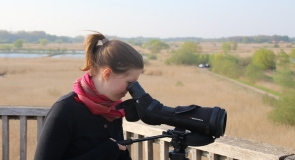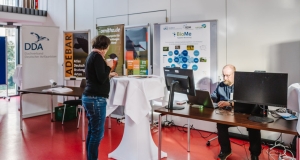Funding
Purpose and Objectives
Together with public authorities, professional associations and other stakeholders the Monitoring Centre is developing structures for a progressive biodiversity monitoring. To address current development needs, the Monitoring Centre has launched a funding call. Until 2028 up to € 2.5 million are available annually for this purpose.
By supporting qualified projects, the organisational and material foundations of nationwide biodiversity monitoring will be further developed. In addition, the projects contribute to strengthening voluntary and civic engagement.
Funding Priorities
The key thematic focus of the projects sought is summarised below. In the document “Erläuterungen zu den Förderschwerpunkten” you will find more detailed information (only available in German).
Subject areas for funding at a Glance
Projects are funded in the following three subject areas:
This subject area aims to operationalise new or further developed technologies and methods for biodiversity monitoring – that is, to integrate them into existing monitoring processes and ultimately establish them as standard practice. Innovative technologies and methods play a crucial role in advancing nationwide biodiversity monitoring. Their successful integration into existing processes enhances efficiency, accuracy, objectivity and scalability. Among other things this requires the development of standards and guidelines, close inter- and transdisciplinary collaboration, and targeted investment in human, technical and professional capacities.
Funding will be provided for selected projects that apply innovative technologies and methods to German biodiversity monitoring in this sense.
This subject area addresses projects that strengthen the commitment of volunteers and citizen scientists in biodiversity monitoring and sustainably integrate them into monitoring activities in Germany. Funding will be directed in particular towards projects of nationwide relevance that address thematic or spatial gaps in existing monitoring schemes, or that provide representative coverage of one or more habitats. Special emphasis is placed on supporting volunteers and building long-term capacities. Good data quality should be ensured through appropriate measures such as training and identification tools. Projects are expected to establish networks of experts and organisations, while also considering long-term perspectives in terms of sustainability and interoperability. Public outreach also plays an important role in raising societal awareness of biodiversity. The main focusses of this funding priority are professionalisation, recognition and long-term integration of volunteering and citizen science in biodiversity monitoring.
This subject area aims at improving the structured, interoperable and sustainable use of biodiversity data in Germany. Funding will be provided for projects that integrate and further develop existing solutions and technologies, and that apply or establish standardised, ideally machine-readable metadata models and uniform data structures. A key concern is the optimisation of data exchange between relevant stakeholders and administrative levels – both horizontally across disciplines and vertically between federal, state and other administrative units. Legal and organisational frameworks should also be examined, with practical solutions for data sharing and governance developed and illustrated. In addition, the funding call supports approaches to the long-term implementation and consolidation of data infrastructures.
In the context of the development of long-term monitoring programmes, the mobilisation of historical or archived biodiversity data may also be funded. The focus here is not simply on general data mobilisation, but on the targeted identification of taxonomic groups or data types for which scientifically sound and methodologically compatible integration into existing monitoring and assessment systems appears feasible.
Funding will be provided for projects that contribute to improving the quality, comparability and usability of biodiversity data. This will create a reliable basis for the coordination, evaluation and management of monitoring activities, as well as for data exchange between stakeholders in Germany.
Procedure
The application process consists of two stages. Interested parties had until 12 October 2025 to submit their project ideas. Following expert review and evaluation, a selection is made in line with the funding criteria. Selected projects will then be invited to submit a formal funding application. For more information, please refer to the German version of this website.
Launch of the First Projects
The Monitoring Centre’s first four flagship projects were launched in 2024. Funding is provided for initiatives with a model character – among them the second Atlas of German Breeding Birds (ADEBAR 2), the expansion of butterfly monitoring (FAMos), the further development of the app Flora Incognita (FloraIncognitaMoni), and the monitoring of small streams (FLOW). These projects exemplify the collaboration of scientific, governmental and voluntary actors. Their shared mission: to create robust data foundations and to strengthen public awareness of biodiversity.
Support from the Monitoring Centre makes it possible to expand technical infrastructures, advance digitalisation and close existing data gaps. The aim is to provide new impetus for nationwide biodiversity monitoring and to further strengthen the citizen science community.



